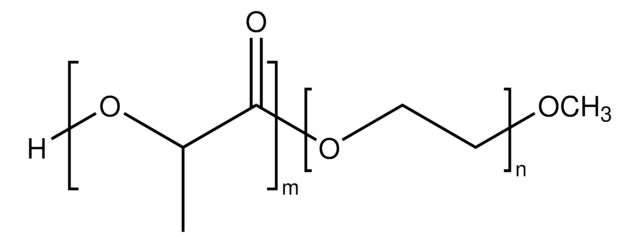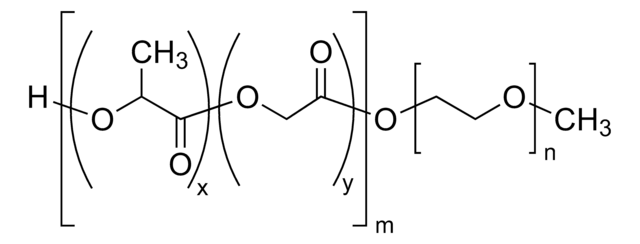900672
Methoxy poly(ethylene glycol)-block-poly(ε-caprolactone)
5k-10k
Synonym(s):
mPEG-b-PCL, mPEG-PCL
Sign Into View Organizational & Contract Pricing
All Photos(2)
About This Item
Linear Formula:
CH3O(CH2CH2O)n(COCH2CH2CH2CH2CH2O)mH
UNSPSC Code:
51171641
NACRES:
NA.23
Recommended Products
Looking for similar products? Visit Product Comparison Guide
Application
Biocompatible, amphiphilic block copolymer composed of a hydrophilic PEG block and a hydrophobic PCL block. These materials have been used as a block copolymer surfactant as well as in control release and nanoparticle formulation for drug delivery applications. Well-defined materials with varying properties can be prepared by controlling the relative length of each polymer block. Hydroxyl termination allows for facile further chemical modification of these materials.
Storage Class Code
11 - Combustible Solids
WGK
WGK 3
Flash Point(F)
Not applicable
Flash Point(C)
Not applicable
Certificates of Analysis (COA)
Search for Certificates of Analysis (COA) by entering the products Lot/Batch Number. Lot and Batch Numbers can be found on a product’s label following the words ‘Lot’ or ‘Batch’.
Already Own This Product?
Find documentation for the products that you have recently purchased in the Document Library.
Customers Also Viewed
Simple solvothermalsynthesis of hydrophobic magnetic monodispersed Fe3O4 nanoparticles.
Liu J, et al.
Mat. Res. Bul., 48(2), 416-421 (2013)
On the mechanism of formation of vesicles from poly(ethylene oxide)-block-poly(caprolactone) copolymers.
Adams DJ, et al.
Soft Matter, 5, 3086-3096 (2009)
Xu Wen Ng et al.
Journal of pharmaceutical sciences, 103(11), 3631-3640 (2014-09-17)
Despite the success that drug-eluting stents (DESs) have achieved for minimizing in-stent restenosis (ISR), the antirestenotic agents used in DES have been implicated in delayed endothelial healing and impairment of endothelial functions. Cenderitide (CD-NP) is a novel antiproliferation chimeric peptide
Xu Wen Ng et al.
Drug delivery and translational research, 5(5), 469-479 (2015-06-24)
Timolol maleate (TM) has been used for many years for the reduction of intraocular pressure (IOP) in glaucoma patients. However, the topical mode of administration (eyedrops) is far from optimal because of the issues of low bioavailability, high drug wastage
Bhuvana S Doddapaneni et al.
Journal of controlled release : official journal of the Controlled Release Society, 220(Pt A), 503-514 (2015-11-19)
Metastatic melanoma has a high mortality rate due to lymphatic progression of the disease. Current treatment is surgery followed by radiation and intravenous chemotherapy. However, drawbacks for current chemotherapeutics lie in the fact that they develop resistance and do not
Articles
The development of drugs that target specific locations within the human body remains one of the greatest challenges in biomedicine today.
Our team of scientists has experience in all areas of research including Life Science, Material Science, Chemical Synthesis, Chromatography, Analytical and many others.
Contact Technical Service





